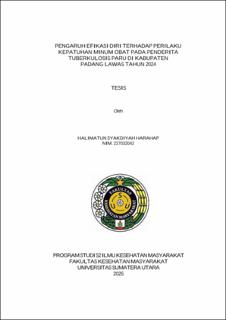| dc.contributor.advisor | Andayani, Lita Sri | |
| dc.contributor.advisor | Rochadi, R Kintoko | |
| dc.contributor.author | Harahap, Halimatun Syakdiyah | |
| dc.date.accessioned | 2025-06-19T08:22:17Z | |
| dc.date.available | 2025-06-19T08:22:17Z | |
| dc.date.issued | 2025 | |
| dc.identifier.uri | https://repositori.usu.ac.id/handle/123456789/104465 | |
| dc.description.abstract | Tuberkulosis(TB) is an infectious disease caused by the bacterium mycobacterium tuberculosis which is one of the top 10 diseases causing death worldwide. The success rate of treatment for newly diagnosed cases of tuberculosis that have been treated is still below the global target of 90%. Based on data from North Sumatra Province, in 2022 the treatment success rate is (90%), while in 2023 (90.5%). The purpose of this study is to analyze the effect of self-efficacy on medication adherence behavior in patients with pulmonary tuberculosis in Padang Lawas Regency in 2024. The type of research was quantitative with a cross sectional research design using purposive sampling techniques, a total population of 1600 people with a sample of 102 respondents. Bivariate analysis was carried out to determine the relationship between the variables of self-efficacy, access to health facilities and the role of drug supervisors, on the variables of drug adherence using the chi-square test while for the variables of drug side effects on drug adherence using the Fisher's exact test and multivariate using multiple logistic regression. The results of the study obtained the influence of self-efficacy (p=0.001, α<0.05), access to health facilities (p=0.040, α<0.05) with medication adherence. The most influential factor on medication compliance behavior was self-efficacy with an Exp (B) value of 5.965 (CI 95%: 1.287-27.283). It can be concluded that the higher the self-efficacy greatly affects the adherence to taking medication, access to good facilities also affects the adherence to taking medication for tuberculosis patients. The suggestion from this study is the need for training of health workers, especially in primary care, to be trained to provide psychological encouragement to patients. | en_US |
| dc.language.iso | id | en_US |
| dc.publisher | Universitas Sumatera Utara | en_US |
| dc.subject | Self characteristic | en_US |
| dc.subject | self efficacy | en_US |
| dc.title | Pengaruh Efikasi Diri terhadap Perilaku Kepatuhan Minum Obat pada Penderita Tuberkulosis Paru di Kabupaten Padang Lawas Tahun 2024 | en_US |
| dc.title.alternative | The Influence of Self-Efficacy on Medication Compliance Behavior in Pulmonary Tuberculosis Patients in Padang Lawas Regency in 2024 | en_US |
| dc.type | Thesis | en_US |
| dc.identifier.nim | NIM227032042 | |
| dc.identifier.nidn | NIDN0022096903 | |
| dc.identifier.nidn | NIDN0019126703 | |
| dc.identifier.kodeprodi | KODEPRODI13101#Ilmu Kesehatan Masyarakat | |
| dc.description.pages | 122 Pages | en_US |
| dc.description.type | Tesis Magister | en_US |
| dc.subject.sdgs | SDGs 3. Good Health And Well Being | en_US |


